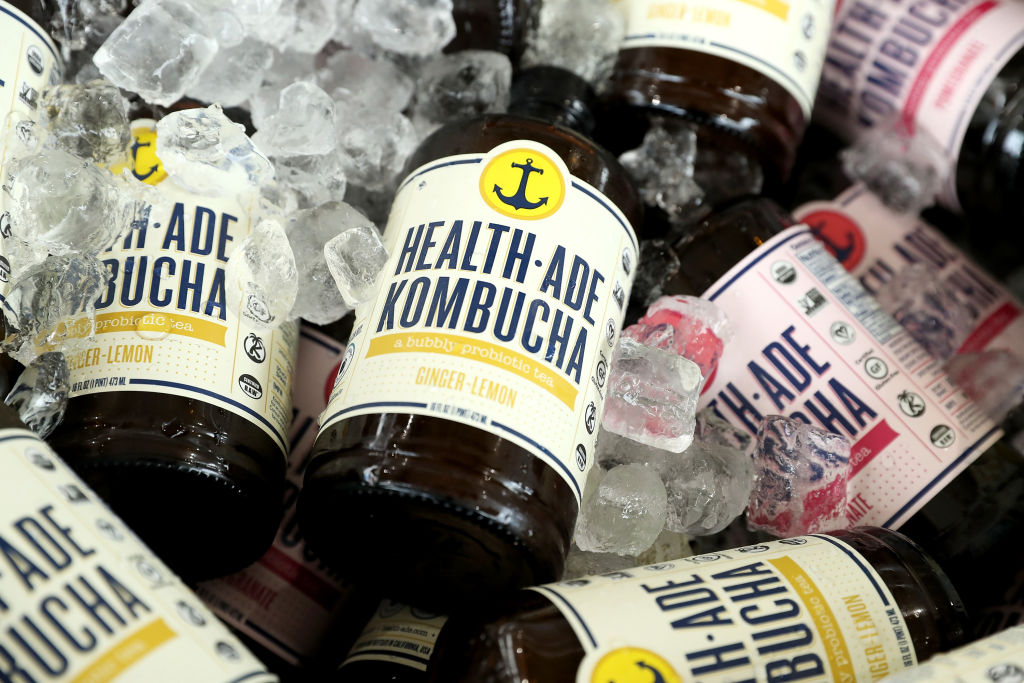I once read the back cover of a book with a brilliant premise: a Silicon Valley wage-slave with a dull, lizard-person sort of existence suddenly has the care and feeding of a legacy sourdough starter thrust upon her. The thing promptly takes over her life and she emerges from the grayscale of soulless app-designed routine into the wild drama of an existence ruled by the whims of a yeast-ridden bacterial culture.
Some are born to fermentation cultures, others acquire fermentation cultures, and yet others have fermentation cultures thrust upon them. I am among the latter school, a mostly grateful victim of fermentation-culture imposition. (Is this what they mean by Stockholm syndrome?)
The story begins long ago, when a friend tried to convince me that the horrid, yellowish brew on her counter, in which a few small, pale lily pads floated aimlessly, would be good for me. Out of civility I consented to sip a bit. My original impressions were confirmed: unpleasant in the extreme. My friend offered me one of the lily pads — she called it a scoby: very poorly named in my view, as the word scoby sounds cool and adventurous, like something related to diving and exploring underwater shipwrecks. With this scoby, she explained, I could start my own countertop swamp.
I declined with ill-concealed horror. When I left, it was with a sense of relief not unmingled with foreboding. I had lived to fight another day, and yet somehow I knew it wasn’t my last tangle with kombucha. The dragon was not defeated. At any time it might yet loom up again over the horizon, emitting brownish smoke and threatening to coopt me into the world of countertop fermentations.
Years went by. Kombucha became popular, available by the can at the grocery store. I never passed it without a slight shudder. Certainly I never tasted it. I railed against it when I could, even in these very pages. And all the while, Fate perched behind me, smirking and tapping its nails against the day.
But like so many days you fear in life, it dawned more gently than I had expected. Various experiences in the meantime had come to soften my prejudices; a year dedicated to home-brewing mead got me used to appreciating dubious-looking liquids in large glass jars. When you make mead from honey you helped collect, out of hives you’ve sat watching through golden summer afternoons as bees zoom and skirl through the meadow flowers, honey you’ve acquired at the price of stings and aching arms — well, no matter how horrid it looks in the carboy, you learn to love that brew.
So when another friend, renowned both for her wonderful hospitality and her brilliant cookery, waxed enthusiastic about her own kombucha jar in the kitchen corner, knotted in a stylish cotton scarf, my guard was down. When she counseled me to drink a third of a glass on an empty stomach, half an hour before eating, I obediently quaffed it off and praised the stuff. And when, on departure, she sweetly packed up a scoby in layers of paper and plastic, then in a paper bag from some high-end perfumery, and pressed it upon me, naming it Medusa, I could only demur that I was flying, and it might perhaps be taken away from me at security.
“If you have any problems, you tell them it’s a compress,” she said kindly. I surrendered.
Naturally Medusa passed through security without so much as an eyebrow raised, though as a rule airport security goes through my every belonging at leisure, shaking spray bottles by their ears to evaluate how much liquid remains, turning miniature toothpaste tubes over and over with an air of baffled unfamiliarity, and identifying threats to the nation in my purse (a stray lipstick. Well, fair enough, it was Dior.)
On arriving back home, the truth hit me: I am the owner of a scoby. It was late and I did not wish to think about the responsibilities of a scoby-owner. I tossed Medusa’s now rather damp parcel into a basin and retired to sleep.
A few days went by in scoby-related procrastination. There were many things to catch up on at home and work, and a small, wicked part deep down in me thought that if I forgot it long enough, maybe the scoby, deprived of nourishing tea solution, would die and I would be relieved of responsibility.
My conscience was not easy, however. When my phone lit up with a warm message from my hostess, inquiring after Medusa’s wellbeing, I was forced to admit she had not yet had her tea. “One liter of water, one black tea bag, and 100 grams brown sugar,” texted my friend. “Boil water, dissolve sugar, leave tea bag in for ten minutes, then take it out and wait until it returns to room temperature. Then feed Medusa.”
So despite all my prejudices, there I stood, stuffing Medusa into a mason jar and giving her sugared tea. “It’s come to this,” I thought to myself, feeling like a young mother who finally gives up the struggle and switches to a minivan. “I’m a kombucha brewer.”
Medusa was a tough gal, but she was also fussy. She didn’t like my mason jar. I gave her a large jug, but that was no good either. She wanted an enormous thing with a spigot she’d spotted high up on top of the cabinets, so I let her have it. Enthroned therein, robed in a tea towel, she dominates the whole corner of the kitchen.
She makes me drink kombucha every day before breakfast. I still rebelliously skip some days, but mostly Medusa has her way. She doesn’t get her sugared tea as often as she’d like, but she revenges herself on me when I skip by going particularly vinegary. She’s good for me — I know I feel better drinking her than not. I don’t get colds as easily as everyone else. When I’m old, I won’t have arthritis, and my blood pressure will be the cynosure of three counties. There are days where I sigh for the carefree days of yore, but mostly Medusa is a benevolent dictatress. Long live the countertop queen.
This article was originally published in The Spectator’s October 2024 World edition.


























Leave a Reply